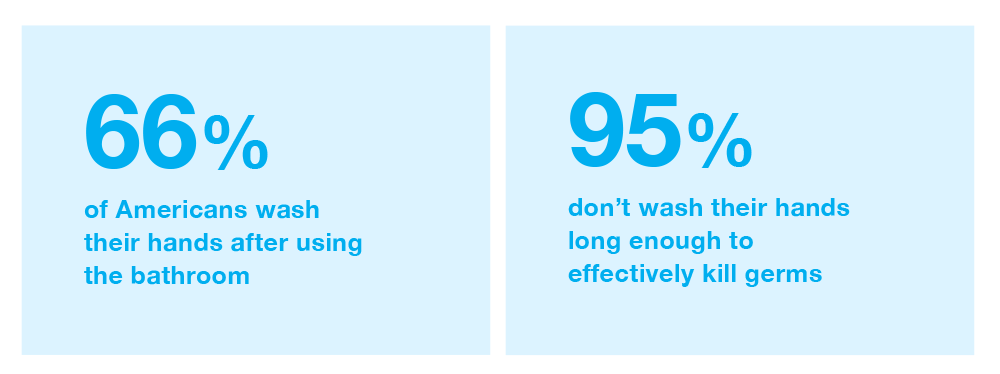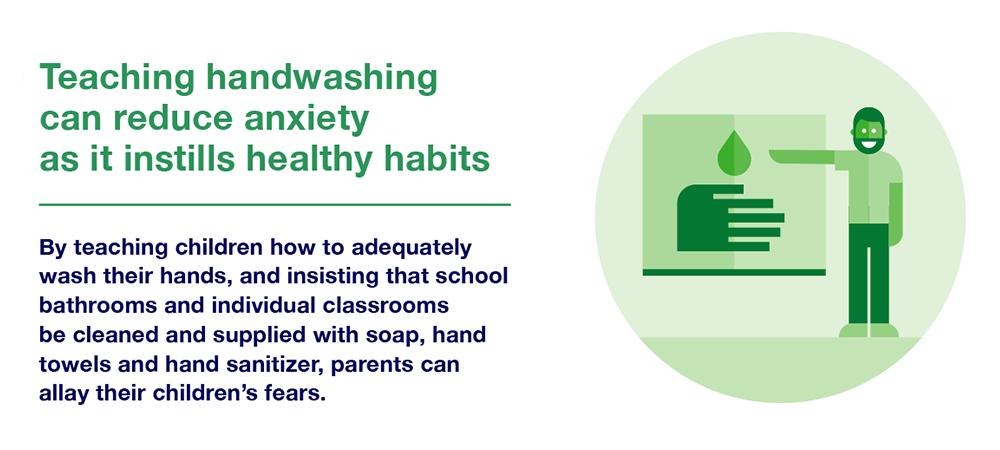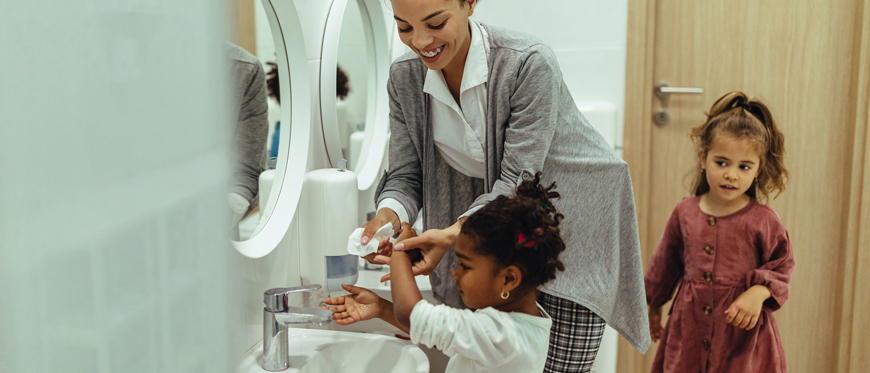“Go wash your hands!” For many people, that refrain is an all-too-familiar echo of childhood. Research on hand hygiene, however, finds that it is actually not familiar enough, or at least not having the intended effect. While simple handwashing can remove 90% of contaminants that can cause serious illnesses like diarrhea and pneumonia, only 66% of Americans wash their hands after using the bathroom, the majority of those don’t always use soap, and almost none of them (95%) wash their hands long enough to effectively kill germs.
 Get the complete infographic (PDF)
Get the complete infographic (PDF)
One: Effective hygiene habits must start in childhood
It’s not that Americans aren’t aware of the need to wash their hands – 92% admit that it’s important. But they’re obviously not making a habit of it, which means that education must be ramped during the time of life when good, lifelong habits can most easily be formed: early childhood.
The best place to learn healthy habits is at home – but it’s not the only place. Schools need to step up, providing the handwashing programs and products that can educate and equip children as early as pre-school and no later than kindergarten. This can not only form good, lifelong habits, it can also immediately improve the educational experience for children, as those age groups otherwise experience unusually high absentee rates, missing as many as one of every five days of school.
 Get the complete infographic (PDF)
Get the complete infographic (PDF)
Two: Teaching handwashing can reduce anxiety as it instills healthy habits
Forty percent of parents worry that their children will suffer from a lack of hygiene at school, and 42% are sufficiently concerned that they actually keep their children from participating in some school activities. These parental concerns are not unfounded; rather, they are based in their children’s experience. Some 86% of school children avoid using the toilets at school, and nearly half of all parents point to unhygienic conditions as the cause.
By teaching children how to adequately wash their hands, and insisting that school bathrooms and individual classrooms be appropriately cleaned and sufficiently supplied with soap, hand towels and hand sanitizer, parents can allay their children’s fears, reduce health-related absenteeism, and create a more relaxed, confident and productive learning environment.
Three: Handwashing reduces childhood illness and keeps kids in school
That last benefit – the reduction of health-related absenteeism – is particularly important in a child’s early education. A recent study shows that more than 10% of kindergartners and first graders in the United States are chronically absent (missing more than 10% of days within a school year). The report goes on to say that “students who are chronically absent in preschool, kindergarten and first grade are much less likely to read at grade level by third grade – which makes them four times more likely to drop out of high school.”
As stark as those statistics may seem, relatively easy solutions like improved handwashing can provide significant improvement. When school children are taught to properly wash their hands, diarrhea rates decline by as much as a third, and respiratory infections are reduced 20%. Fewer illnesses mean fewer trips to the doctor, less use of antibiotics, and more time in class.
Schools can get free support for teaching hand hygiene
Fortunately, the teaching of handwashing isn’t something that schools need to take on alone. Many programs and resources exist specifically to help educate children about hand hygiene, from Global Handwashing Day to handwashing programs pointed out by the Center for Disease Control (some of which even give awards for schools that create the best handwashing campaigns).
It’s time to start teaching pre-school and kindergarten students how to wash their hands. What is your school system doing?
Get the complete infographic (PDF)
Sources:
Essity: 2018 Hygiene and Health Report
CDC: Handwashing: Clean hands save lives
LiveScience: Just 5% of bathroom users wash hands correctly
Huffington Post: Here’s how many people actually wash their hands after using the bathroom
NIH: Health and academic achievement
Robert Wood Johnson Foundation: The relationship between school attendance and health
